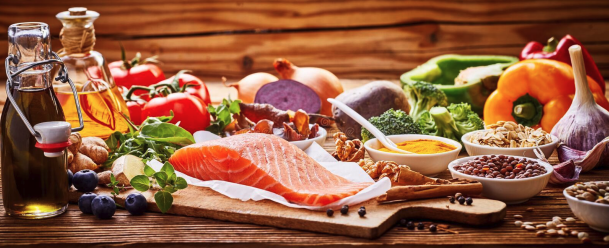
Heart Healthy Foods
A recent study (August 1, 2022) in The American Journal of Cardiology shared some grim outlooks with respect to cardiovascular diseases in the U.S. Based on current trends; the journal article predicted the four biggest contributors to heart disease would all increase significantly by 2060 with a prediction of diabetes to rise by 39.3%, dyslipidemia, (elevated lipids) by 27.6%, hypertension by 25% and obesity by 18%.
The biggest increases were seen in predicted elevations in stroke, heart failure, and heart attack; all predicted to be at levels over 30%. The increases were seen mostly in the female and ethnic/minority populations. While equitable access to healthcare is involved in the equation to tackle these increases, the primary focus needs to be on prevention with education on the role of diet and lifestyle factors. Hundreds of studies have supported that prevention is the key to reversing these trends, yet little has been done to educate Americans on the details of such interventions. Dietary interventions can provide the most significant change.
A plant-based diet is fundamental, with animal foods accounting for just a small portion of calories.
Processed foods composed of high saturated fats and carbohydrates must be avoided. Recommendations for a heart-healthy diet include abundant fruits and vegetables, whole grains (brown rice, whole wheat, unprocessed oats), legumes (pinto, black beans, garbanzo beans, lentils), lean sources of animal protein in smaller quantities, fish and plant sources of protein like edamame and tofu. Addressing the sources of these foods by choosing organic, grass-fed options when able would only improve overall outcomes.
Heart-healthy foods can directly impact the cardiovascular system by improving lipid profiles, reducing inflammation, and increasing nitric oxide (NO) levels, a compound beneficial for optimal blood flow, which can optimize blood pressure and sexual function.
The top foods for heart health are generally plant-based whole foods. The benefits of consuming more of these foods: a reduction of cardiovascular disease risk, improved cholesterol levels and reduction of blood pressure, weight reduction, and improved sexual function.
- Beets
Beets have a great nutritional profile as they are high in beneficial vitamins and minerals and low in calories. Beets contain a powerful antioxidant called betalains which can reduce inflammation Beets are high in nitrates which can be directly converted to nitric oxide in the body. A study of 38 individuals who consumed beet juice daily increased the nitric oxide levels in their blood by 21% after only 45 minutes.
- Garlic
Garlic has been shown to have medicinal properties due in part to its active ingredient, allicin. Allicin has been shown to reduce LDL levels by as much as 17 gm/dl. Also, allicin found in garlic extract has been shown to inhibit plaque buildup, and concentrations of 600-1500 mg per day have reduced blood pressure and pharmaceutical agents. This is in part because the consumption of garlic is associated with improved NO levels. The increase in NO is due to the activation of an enzyme called nitric oxide synthase which converts L-arginine to nitric oxide. L-arginine is an amino acid byproduct of nuts and seeds, grass-fed meats, fish, eggs, and sea vegetables. Consumption of garlic has been shown to increase NO levels by 40% within an hour. To optimize the medicinal properties of garlic, it is best to use raw garlic, minced or crushed, and allow it to sit for at least 20 minutes. - Meat and Seafood
A heart-healthy diet includes animal protein in reduced amounts (2-3 oz servings) compared to the Standard American Diet (SAD). It avoids processed meats like bologna, hot dogs, and bacon. Animal proteins are excellent sources of CoQ10 which preserve nitric oxide levels. CoQ10 is also a powerful antioxidant that neutralizes free radicals that can be damaging to vasculature and tissues. Foods like organic grass-fed lean meats and fatty fish are highest in CoQ10. Fish are high in omega 3s which have been shown to decrease plaques in arterial vessels and reduce triglyceride levels, known risk factors for heart disease. - Dark Chocolate
A welcomed addition to the list, dark chocolate is loaded with flavanols. Research has shown that flavanols can help establish optimal levels of nitric oxide. A 15 days study of 16 individuals consuming 30 gm of dark chocolate daily improved NO levels and reduced blood pressure readings. A 2017 American Journal of Heart Disease study showed that dark chocolate alone was also associated with improved lipid profiles. Chocolate can be high in sugar, so dark chocolate needs at least 75% or higher concentration of cacao. Also, buyer beware as recent data has shown high levels of heavy metals like cadmium and lead in certain brands of dark chocolate, so choose wisely. - Leafy Greens (kale, spinach, chard, arugula)
Leafy greens are packed with nitrates, then converted to nitric oxide in the body. One study showed eating nitrate reach foods with spinach increased NO levels 8-fold!! Leafy greens are also high in potassium and magnesium. Potassium can counterbalance the effects of sodium, and magnesium is helpful in blood pressure maintenance, thus helping to curb the risks of hypertension. Leafy greens are also high in Vitamin K, a fat-soluble vitamin that can protect arteries and improve blood clotting known to be associated with vascular damage. Studies have shown regular consumption of dark leafy greens can reduce heart disease by as much as 16%! - Citrus Foods
Vitamin C, found in citrus foods, can improve the bioavailability of NO by maximizing absorption and stimulating the activity of an enzyme called nitric oxide synthetase, the enzyme directly involved in NO production. Plus, citrus is high in fiber and flavonoids, which have been shown to improve HDL levels, reducing LDL and triglyceride levels.
- Nuts/Seeds
Nuts and seeds are great protein sources and high in the amino acid L-arginine. L-arginine can be converted into NO. Consumption of nuts and seeds can thus enhance NO levels. One study of over 2500 individuals showed high intake of foods high in L-arginine was associated with increased nitric oxide levels after only 2 weeks. Nuts especially are calorie dense and high in fats, so some discretion in amounts should be considered. - Red Wine
Another popular entry is red wine which contains resveratrol and antioxidants. One of the daily habits of centenarians living in the Blue Zones is the consumption of red wine in small quantities. Studies have shown that consuming small quantities can increase the action of nitric oxide synthetase, the enzyme involved in NO production. - Legumes
Legumes are high in plant-based protein and fiber but contain a high concentration of antioxidants, B vitamins, and minerals. All of these can prevent plaque buildup in blood vessels and can also optimize blood flow. Beans are also high in fiber and antioxidants and provide a great protein source low in saturated fats like animal protein. - Walnuts
Walnuts get their own category. High omegas consumption of walnuts has been linked to heart health. The Nurses’ Health study showed one serving of walnuts a week was associated with a 19% reduction in cardiovascular disease. - Avocados and Avocado oil
Because they are rich in heart-healthy unsaturated fats and fiber, avocados can help reduce your risk of cardiovascular disease and stroke. Clinical trials have consistently found that eating avocados can lower your LDL cholesterol and benefit lipid and lipoprotein profiles. Plus, avocados are high in potassium which can counterbalance the effects of sodium and improve blood pressure. - Berries
Berries like blueberries, raspberries, blackberries, and strawberries are high in polyphenols(anthocyanin), powerful antioxidants known to neutralize free radicals that can damage blood vessels and organs like the heart. A review of over 22 studies examining the consumption of 2 or more servings of berries a week showed an association with improved insulin resistance score, reduced LDL levels, reduced systolic blood pressure, and reduced inflammation markers. - Olives and Olive oil
A staple of the Mediterranean diet, olives and olive oils provide monounsaturated fats, which have been shown to reduce lipids. The antioxidant oleic acid found in olives is also a powerful anti-inflammatory that further enhances heart health. Studies have shown that regular consumption of olive oil is associated with a 35% reduction in heart disease risk. Choosing olive oil is paramount. Always choose organic extra-virgin olive oil from reputable sources. Also, if used to cook, only use this oil at low heat as higher heat can denature it and turn it into a trans-fat. This oil benefits when drizzled over cooked foods or used in sauces and vinaigrettes.
- Whole Grains (whole wheat, brown rice, quinoa, buckwheat, oats, barley)
Refined carbohydrates (carbohydrates processed or stripped of their natural fiber) can contribute to metabolic changes that can drive cardiometabolic diseases; however, whole grains (grains provided in their natural state) can benefit cardiometabolic health. High in fiber and B vitamins, studies have shown daily consumption of whole grains was associated with a 22% reduction in heart disease risk. Of course, being mindful of total carbohydrate intake and serving size is also important. Also, be careful when choosing products with “whole grain” labels that do not contain the grains in their natural state. - Edamame and Organic Soy Products
Edamame is a natural soy product rich in isoflavones, a flavonoid known to reduce lipids and improve cardiovascular health. In its natural state, soy is also high in fiber and antioxidants. Studies have shown adding 30 gm of soy protein to a heart-healthy diet was associated with lipid-lowering effects. Discretion is needed in the selection of soy products. Avoidance of GMO soy or non-organic, processed forms is recommended as most of the negative reports of soy were based on these forms. - Green Tea
Green tea provides polyphenols and catechins, which have been shown to improve insulin sensitivity and act as powerful antioxidants which prevent cellular and vascular damage and reduce inflammation. Drinking regular green tea or adding green tea extract to smoothies, oatmeal, or sauces can reduce LDL cholesterol, triglycerides, and blood pressure.



